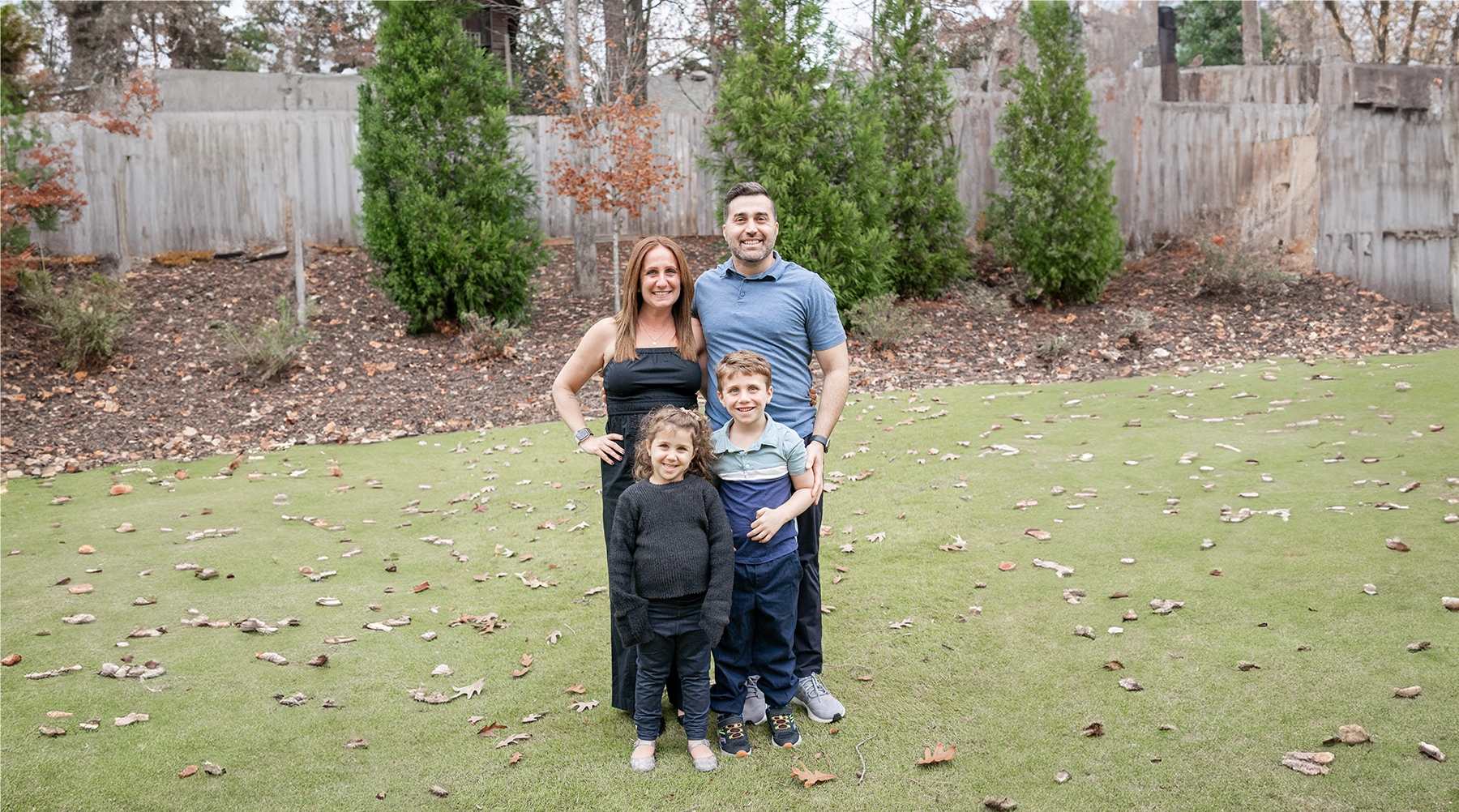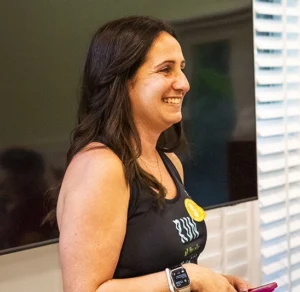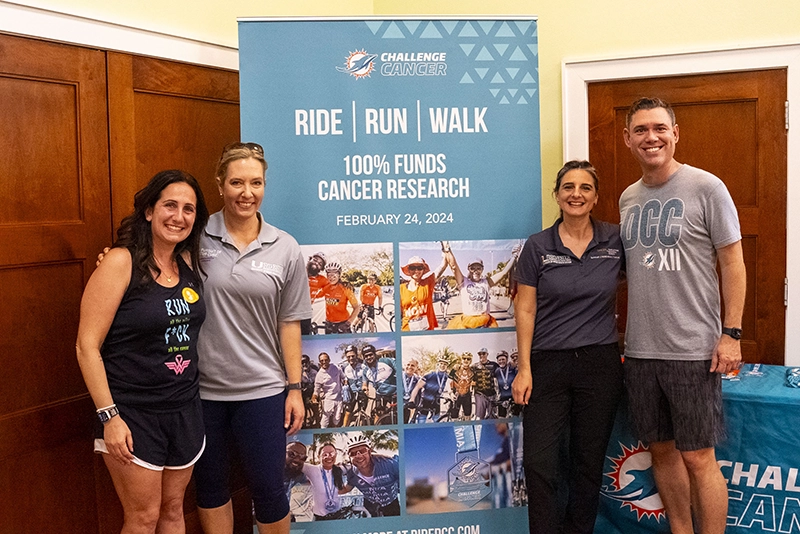Knowing Your Cancer Risk Can Be Empowering

Tracey Hecht still remembers receiving the news on May 12, 2020. Walking with her two children, she paused the stroller near a waterfall in the park to answer a phone call. The tranquil waters nearby did nothing to quench the growing negative feelings — it was breast cancer.

That unforgettable experience was three years ago for Hecht, who finished treatment in 2022 and has been cancer-free for more than two years.
“I’m feeling pretty good and healthy, though I still have some aftereffects and worry about recurrence,” Hecht says. “I have proudly hit the three-year mark and have a positive outlook as I prioritize what’s important in my life.”
Each year, more than 200,000 women develop breast cancer and will go through an experience similar to Hecht’s. However, not all will know if they have a genetic predisposition that puts them at high risk.
Before her diagnosis in 2010, Hecht found out she had the BRCA 1 gene.
This gene produces proteins that help repair damaged DNA, but if it develops specific mutations, cancer is more likely to occur, such as breast and ovarian cancer.
“Learning that one carries a pathogenic genetic mutation should not be perceived as bad news but rather empowering news,” says Carmen Calfa, M.D., a breast medical oncologist at Sylvester Comprehensive Cancer Center and Hecht’s oncologist. “It allows you to receive the right cancer screening and preventive measures at the right time.”
Tests are available to see if someone has inherited the BRCA1 or BRCA2 genetic mutations.
Though not currently recommended for the general public, they can be provided as needed for those with a higher likelihood of carrying these variants, such as an individual with a family history of cancer or certain ethnic groups. Aside from the BRCA 1 and 2 mutations, other pathogenic genes can be found through genetic testing, says Dr. Calfa.
Should You Plan a Family if You Might Get Cancer?
While the preventive follow-ups lasted for more than a decade, Hecht wanted children and was worried about how the MRI would interact with her pregnancy. If Hecht had any regrets from her health experience, it was the pause she made on her testing.
“Instead of continuing with ultrasound, I stopped for two years out of fear of it interfering with my pregnancies and breastfeeding,” Hecht recalled. “Looking back, I wish I still would have gotten some imaging for my breast like I was doing with my pelvis, but the young brain thinks it’s invincible.”
“It’s important for BRCA 1 carriers planning a family to understand their risk and seek expert guidance,” Dr. Calfa says. “Reproductive assisted fertility can help select unaffected embryos, preventing transmission of the pathogenic gene. Depending on the stage of pregnancy, regular breast images can be safely done, and any changes should be promptly addressed.”
When Hecht was breastfeeding, she had the feeling there was something wrong.
When she was breast pumping with her firstborn, Hecht found out she had a lot of clogged breast ducts and lumps as a result. Though she didn’t think much of it, by her second child, Hecht remembered feeling beyond tired and getting night sweats and fevers.
“It turns out the sweats were due to my regional lymph nodes, which also explained my stomach issues,” Hecht says, “I had my biopsy on a Friday and, a few days later, got diagnosed with breast cancer.”
With her diagnosis known, it was time for the Hecht family to act.
The process was a swift one for Hecht, who understood what her father was going through as he was diagnosed with lymphoma years prior.
“The waiting for the results was the worst part,” Hecht says. “As soon as my family knew of the results, it was time to get things done. My brother drove my mom down to be with me, and my husband put his emotions aside and became even more hands-on. Even my friends and neighbors pitched in with driveway dinners and going on walks.”
While all sorts of statistics are out there, Dr. Calfa assured Hecht, “Let go of the statistics and all sorts of scenarios as your cancer is your cancer and will behave in its unique way.”

After all the ups and downs – 16 rounds of chemo, various therapies and the support of her cancer mentors, one of whom Dr. Calfa introduced to her – she says that, in addition to being cancer-free, her life has improved. She feels greater empathy and does not stress about the small details. She has also grown closer to her loved ones.
Hecht’s advice to other women who receive a breast cancer diagnosis:
- Don’t be afraid to accept help. While the majority of those with cancer think it makes them weak, you aren’t admitting defeat. Take all the help you can get, and don’t be scared to make requests.
- Focus on yourself and your health.
- Keep moving. This mindset allowed Hecht to keep feeling just like herself. Cancer takes so much, and exercising kept Hecht in control with a part of her old life still there.
- Keep up with routine, preventive testing.
Sylvester has a dedicated program for positive genetic mutation carriers called the Genetic Predisposition Syndrome Clinic (GPS), which the Eileen Youtie Hereditary Predisposition Initiative supports. Built to be a home for families diagnosed with a hereditary cancer predisposition, the clinic is committed to conducting research toward discovering new cancer treatments and ways to prevent cancer, especially in those who are at the highest risk.
Joey Garcia is a contributor for Sylvester Comprehensive Cancer Center.
Tags: Dr. Carmen Calfa, GPS clinic, Sylvester Comprehensive Cancer Center
